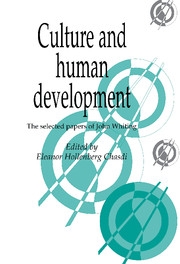Book contents
- Frontmatter
- Contents
- List of figures
- Preface
- Acknowledgments
- Introduction: John Whiting and anthropology
- Fifty years as a behavioral scientist: autobiographical notes
- Part I Theory and methods
- Part II Environment and history
- Part III Moral development
- Part IV Gender development
- Introduction
- 8 The absent father and cross-sex identity
- 9 Effects of climate on certain cultural practices
- 10 Male sex-role resolutions
- Part V Development of social behavior
- Bibliography
- Complete bibliography of John W. M. Whiting's work
- Index
9 - Effects of climate on certain cultural practices
Published online by Cambridge University Press: 23 December 2009
- Frontmatter
- Contents
- List of figures
- Preface
- Acknowledgments
- Introduction: John Whiting and anthropology
- Fifty years as a behavioral scientist: autobiographical notes
- Part I Theory and methods
- Part II Environment and history
- Part III Moral development
- Part IV Gender development
- Introduction
- 8 The absent father and cross-sex identity
- 9 Effects of climate on certain cultural practices
- 10 Male sex-role resolutions
- Part V Development of social behavior
- Bibliography
- Complete bibliography of John W. M. Whiting's work
- Index
Summary
In the course of research at the Laboratory of Human Development during the last few years, it was discovered quite unexpectedly that there is a biased geographical distribution of societies in which boys are circumcised. They occur more commonly in tropical than temperate regions and more commonly in the Old World than in the New World. This distribution is shown in table 19.
It can be seen from this table that genital mutilations are almost entirely restricted to Africa and the Insular Pacific, which regions are largely situated in the tropics. It should also be noted that they do not occur in tropical South America. It is the purpose of this paper to explore the possibility that certain ecological factors may account in part for this biased distribution.
Two recent studies (Whiting, Kluckhohn, and Anthony 1958; Burton and Whiting 1961) concerned with the function of male initiation rites have shown that the circumcision of boys, particularly when it forms a part of such rites, is associated with exclusive mother–infant sleeping arrangements, a prolonged postpartum sex taboo, and patrilocal residence. It is not appropriate in this paper to discuss the various interpretations of these associations (Burton and Whiting 1961; Young 1962) but simply to report that they are strong enough to make the presence of one or more of these customs in a society a good predictor of the presence of circumcision in that society. An investigation of the possible functions of these three customs therefore provides a good starting point for this inquiry into the possible effect of ecology on certain cultural practices.
- Type
- Chapter
- Information
- Culture and Human DevelopmentThe Selected Papers of John Whiting, pp. 221 - 236Publisher: Cambridge University PressPrint publication year: 1993



